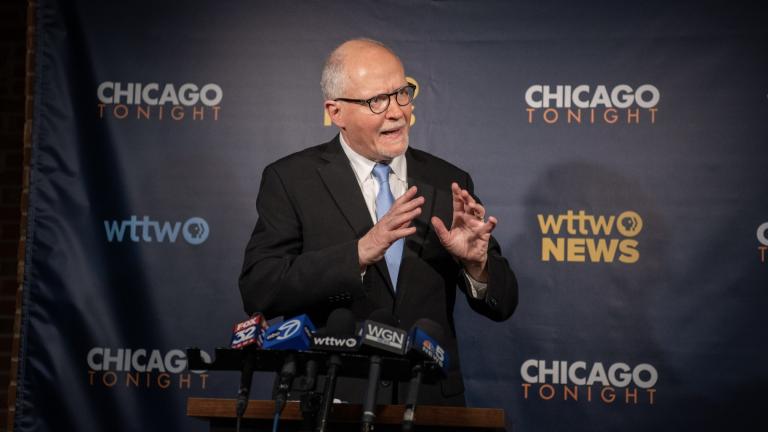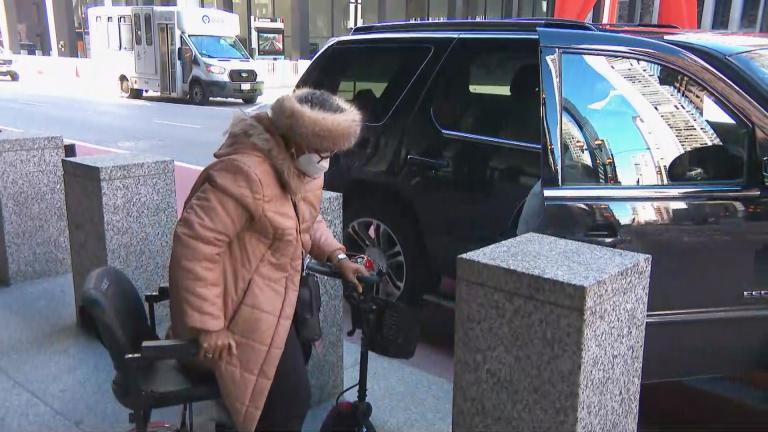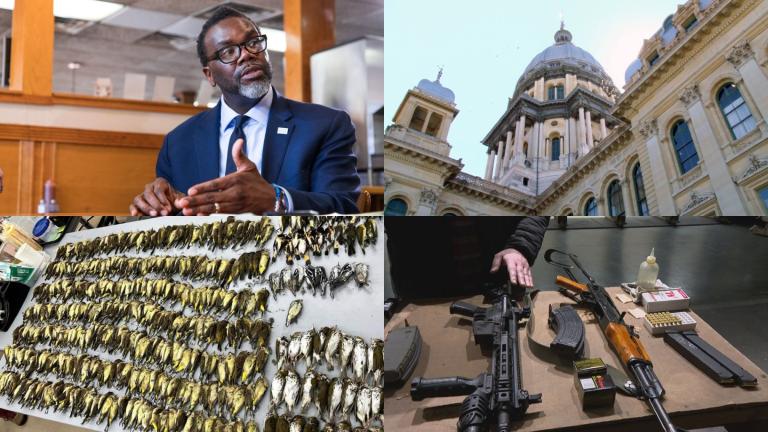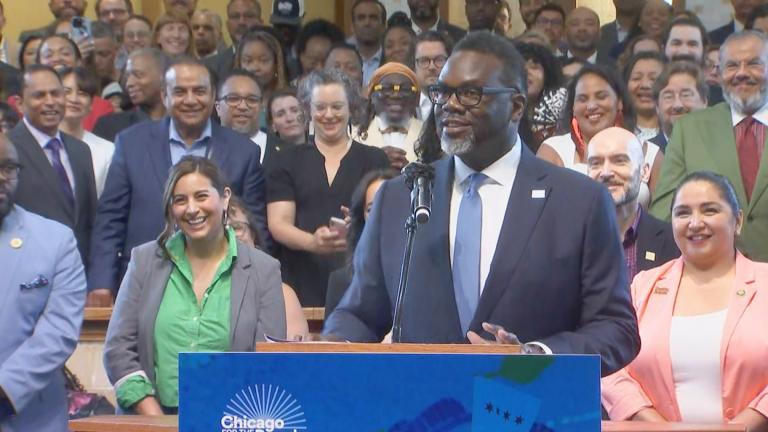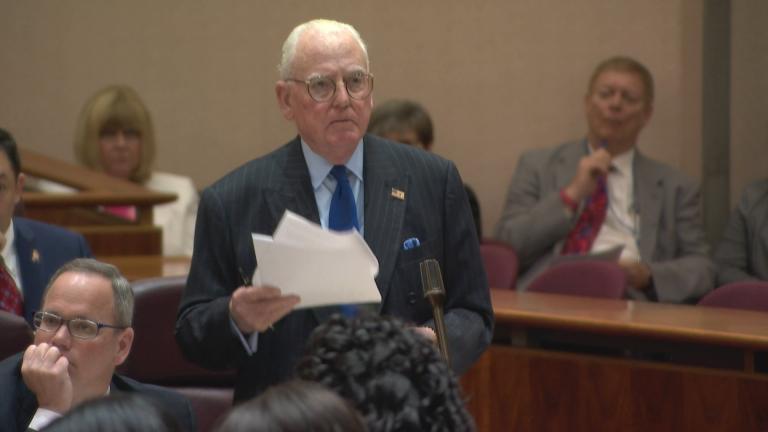With one final weekend of campaigning ahead of them, the race between Brandon Johnson and Paul Vallas for Chicago mayor is down to the wire.
Both candidates will spend the final days of what is shaping up to be the closest election in Chicago history scrambling for any possible advantage – and trying to make sure their supporters cast a ballot.
The announcement that a New York grand jury indicted former President Donald Trump roiled the final stretch of the campaign that began in earnest just before Halloween, when Johnson, a Cook County commissioner, jumped into the race against Vallas, the former CEO of the Chicago Public Schools, who announced his bid for mayor in June.
Vallas immediately released a statement heralding the indictment as evidence that no one is above the law and asserting that the former president, who is running for the Republican nomination, “repeatedly and shamelessly violated the rules and norms that govern the office of the president, cheapening the most widely respected elected position in the world and demeaning our democracy.”
But Johnson – who has repeatedly accused Vallas of being a Republican at heart if not in name – used the indictment to highlight the decision by a political action committee founded by and funded by Betsy DeVos, Trump’s education secretary, to spend $59,385 on digital ads to boost Vallas’ campaign.
Like DeVos, Vallas is a longtime supporter of efforts to expand charter schools and backs programs that use public funds to pay tuition at private schools. Vallas’ education platform vows to lift the cap on enrollment in “high-performing charters,” favors allowing charter schools to locate in empty or near-empty public school buildings if “they serve neighborhood children” and backs programs that use public funds to pay tuition at private schools, according to his website.
By law, independent expenditure committees are barred from coordinating directly with campaigns, but they can — and often do — tailor their messaging to align with efforts directed by the candidate.
“I’ve never had any conversations or contact with Betsy DeVos, and our campaign has not received any money from her,” Vallas said during a forum hosted by WBEZ, the Chicago Sun Times and the University of Chicago’s Institute of Politics.
A statewide advocacy organization designed to promote charter schools reported spending an additional $65,000 to oppose Johnson’s campaign and support Vallas, according records filed with the Illinois State Board of Elections. In all, the INCS Action Independent Committee, funded by the Illinois Network of Charter Schools, has spent approximately $683,000 to boost Vallas’ campaign.
Johnson’s campaign also blasted the Vallas campaign after a Chicago activist charged in connection with the Jan. 6 insurrection at the U.S. Capitol campaigned for Vallas outside the rally held by U.S. Bernie Sanders for Johnson at the University of Illinois at Chicago.
“Paul Vallas has invited this support from Trump insurrectionists by fundraising from Trump megadonors, receiving the support of Betsy DeVos’ Super PAC, and calling Trump’s impeachment a ‘witch hunt’ on conservative talk radio,” Johnson campaign senior advisor Jason Lee said in a statement.
A spokesperson for the Vallas campaign said they "had no contact with this person and had nothing to do with his presence" at Johnson's rally, and accused Johnson of wanting to change the subject from the issues in the race.
Mail Voting A Flashpoint
However, the Vallas campaign has also declined to denounce remarks made by former 12th Ward alderperson and current Cook County Board of Review Commissioner George Cardenas asserting that Johnson’s campaign was using ballots cast by mail to “cheat.”
Cardenas’ remarks echoed false statements made by former President Donald Trump before the 2020 presidential election. Trump and other Republicans often falsely said that ballots cast by mail were more likely to be fraudulent than those cast in person and on Election Day. Those statements helped fuel both efforts to overturn President Joe Biden’s victory and the Jan. 6 insurrection at the U.S. Capitol.
Cardenas, a Democrat, told WTTW News he was trying to inspire Vallas supporters to vote during his remarks.
In the first round of voting, which narrowed the field of nine candidates to the final two, those who cast a ballot for Johnson were more likely to vote by mail, shaving 3 percentage points from Vallas’ first-place finish from Election Day to the certification of the election. That could make the Associated Press and other news organizations reluctant to call the race to be Chicago’s 57th mayor on Tuesday night.
Fueled by changes made during the COVID-19 pandemic, the number of votes cast by mail soared by nearly 20% in the first round of voting as compared to the 2019 election, according to data from the Chicago Board of Election Commissioners.
That means fewer than 48% of all votes were cast on Election Day, giving both campaigns an incentive to get their supporters to the polls as soon as possible.
The number of ballots cast by mail and in-person during early voting through Thursday is 75% higher than it was four days before the 2019 mayoral runoff, and 45% higher than it was four days before the 2015 runoff.
Approximately 150,000 mail-in ballots have yet to be returned to elections officials. While those votes must be postmarked no later than Tuesday, they will be counted as long as they arrive by April 18, officials said.
Contact Heather Cherone: @HeatherCherone | (773) 569-1863 | [email protected]

